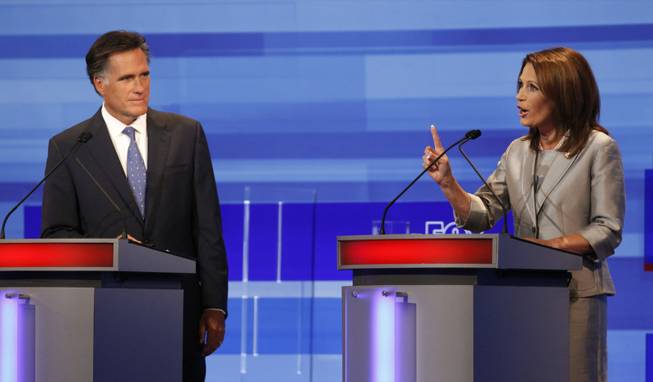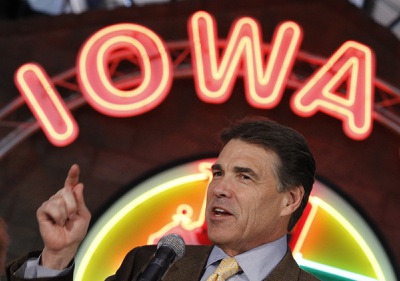
Charlie Neibergall / AP
Republican presidential candidate Rep. Michele Bachmann, R-Minn., speaks as former Massachusetts Gov. Mitt Romney listens during the Iowa GOP/Fox News Debate at the CY Stephens Auditorium in Ames, Iowa, Thursday, Aug. 11, 2011.
Thursday, Aug. 18, 2011 | 2 a.m.
Related story
- Nevada GOP hasn’t kicked into caucus mode — yet (8-16-2011)
In the field of Republican presidential nominees, Mitt Romney is still the candidate to beat in Nevada.
If polls and momentum are any indicator, someone just might.
Romney’s reign in Nevada was solidified when he won the 2008 caucuses with more votes than all other candidates combined and a 37-point lead over his next-closest competitor.
Since he entered the 2012 presidential race, he has nurtured the Nevada relationship. Romney came to North Las Vegas to record his first campaign commercial, and barely a week after the Iowa straw polls, he’s got one of the few and certainly the most formidable ground operations in place, having logged more visits to the Silver State than any other GOP competitor.
But spiking national interest in Texas Gov. Rick Perry’s entry, the surprisingly strong showing of Minnesota Rep. Michele Bachmann, and the newly demonstrated discipline of Texas Rep. Ron Paul’s campaign have gripped Nevada voters, already erasing the phenomenon of an untouchable Romney lead — even if the rest of the field hasn’t quite started paying attention.
“Everybody’s competing to be the anti-Romney, that’s all this is, who can best take on Romney for the nomination,” Nevada GOP consultant and lobbyist Robert Uithoven said.
A poll this month put Romney’s share of registered GOP voters — Nevada’s is a closed caucus — at 31 percent. But Perry, still a rumored candidate at the time of the poll, wasn’t too far behind with 18 percent, and that with almost 40 percent of Nevada GOP voters claiming they were not familiar enough with Perry to register an opinion on him.
Bachmann and Paul also claimed double digits, meaning at this juncture, unlike in 2008, there are more Nevadans looking elsewhere than sticking with Romney.
“We take all candidates in this race seriously,” Romney spokesman Ryan Williams said. “We’re focused on running a campaign that contrasts the governor’s with President (Barack) Obama’s failed leadership ... His pro-jobs, pro-business message appeals to Nevada voters, and he intends to continue to campaign on that message.”
So far, there’s quite a bit of unanimity in what issues and what person the GOP field are focusing on.
“This campaign is going to come down to economic issues and jobs issues, and there is a very big contrast between the policies Gov. Perry has put into place that allow companies to hire people versus what the Obama administration has put in,” Perry spokesman Mark Miner said. “The governor’s going to campaign vigorously in Nevada to win.”
In head-to-head matchups versus Obama, Romney polled within the margin of error to post 46 percent of Nevadans compared with Obama’s 47. Perry only lags by a few points: He posts 40 to Obama’s 49.
Romney’s diminished dominance isn’t just about the arrival of a few new and exciting faces, though. It also says something about how Nevada politics have changed since 2008.
The most obvious shift is the rise of the Tea Party. In Nevada, renegade voters used to just be Ron Paul supporters, but since the last election, the movement took on a momentum of its own, pushing the GOP to the right, and Nevada further from traditionally moderate Republicans to Tea Party trumpeters such as Sharron Angle.
If there’s a Tea Party candidate in the presidential race thus far, it’s Bachmann.
“Clearly Congresswoman Bachmann has strong support from the Tea Party,” said her spokeswoman Alice Stewart, identifying Bachmann’s key constituency among Nevada voters. Although she identified Nevada as “certainly a critical state in the primary season,” she said Bachmann had no plans as of yet to make an official introductory visit.
But there’s another, potentially more potent difference between this and four years ago, too: In 2012, more people are paying attention.
“Romney’s constituents communicate a lot more, so they were able to turn out at a higher rate,” said Carl Bunce, Nevada campaign chairman for the Paul campaign, which came in second to Romney in 2008. Bunce said he expected that in 2012, more publicity and better organization in the GOP generally would likely double turnout on caucus day.
“The low turnout was favorable to Romney because he had a built-in organization in the (Mormon) church,” Bunce said. “High turnout will fix that.”
But ginning up turnout depends on having a powerful local operation — and how the candidates divvy up Nevada’s ground game gurus could be a giveaway of how much effort each intends to expend.
Romney has lined up Ryan Erwin, who successfully masterminded his 2008 state campaign. Meanwhile, November Inc.’s Mike Slanker and R&R Partners’ Pete Ernaut are expected to be tapped by the Perry campaign.
When it comes to the rest, the question is: Is it worth it to fight hard in Nevada, especially since the potential prize is minimal, as the caucuses aren’t winner-take-all?
Nevada may be more strategic for its place in the election calendar than decisive come convention time. The caucuses take place just a few days after the New Hampshire primary: perfect timing to solidify a Granite State win, or a chance to wrest back the spotlight if Iowa and New Hampshire don’t yield a common victor.
But the candidates’ level of confidence about South Carolina — even though its primary comes 10 days after Nevada’s caucuses — is also key.
“We’re a pretty hefty plane ticket expense away — a lot of time in the air that’s not time spent in a coffee shop,” Uithoven said. “No presidential nominee has ever gained the nomination without winning South Carolina. I would love to see Nevada do well, as a Nevadan, but ... South Carolina is still a whole lot more important in historic terms, because the nomination runs through South Carolina.”
Perry and Bachmann have, even in their relatively young campaigns, logged time in South Carolina, a state which will only have one more electoral vote than Nevada come 2012.
Other state GOP operatives thus remain hopeful that candidates will really consider Nevada as important to their campaign calculations as early election cycle lip service would suggest — not least because the competition will raise the state’s profile of relevance.
“I just believe that Nevada is certainly a bellwether state,” former Nevada Gov. Bob List said. “We have been on the winning side of every presidential election with only one exception in the last 100 years.”
Sun reporter Anjeanette Damon contributed to this story.


Join the Discussion:
Check this out for a full explanation of our conversion to the LiveFyre commenting system and instructions on how to sign up for an account.
Full comments policy